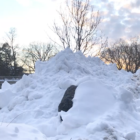News
Greater Lansing Records Biggest Snowfall in 22 Years, See How Students Spent the Day.
|
EAST LANSING – Wednesday, February 2nd turned out to be the snowiest February day in Mid-Michigan in 22 years. Some spots in East Lansing got 16 inches. The storm made driving at night treacherous. It seemed like a snowball fight got a little more traction, whether they enjoyed it, or not. “Anyways, we regret being out here,” said MSU Freshman Anna Zacharski.
